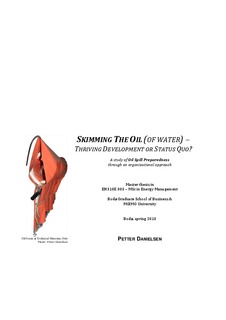| dc.description.abstract | This thesis attempts to illuminate the challenges facing Norwegian oil spill preparedness, and
how these can be approached in the best possible way, with the intent to make oil spill
preparedness more effectively. Organizational aspects are in focus.
The research has an inductive approach. Interviews have been carried out with several
companies producing services or products related to oil spill preparedness, including the three
major players in the Norwegian oil spill preparedness – the Norwegian Clean Seas
Association for Operating Companies (NOFO), the Norwegian Coastal Administration and
one of the inter-municipal committees against acute pollution (IUA).
The main findings are as follows:
- Shipping represents the greatest risk of oil spills.
- Near-shore preparedness has room for improvement, while offshore preparedness is
perceived as good.
- Challenges thought to be solvable are mainly of organizational nature – more
specifically when it comes to the interaction between the players involved in oil spill
response actions.
Practical implications constitute a proposal to include the organizational challenges in the
quest to achieve effective preparedness. Theoretical implications relates to whether the
theories of temporary organization, project management and risk management can be applied
in an oil spill response action. The former of these is suitable, while the latter two can provide
useful perspective on things, but needs to be adjusted to the situation in question. | en_US |
